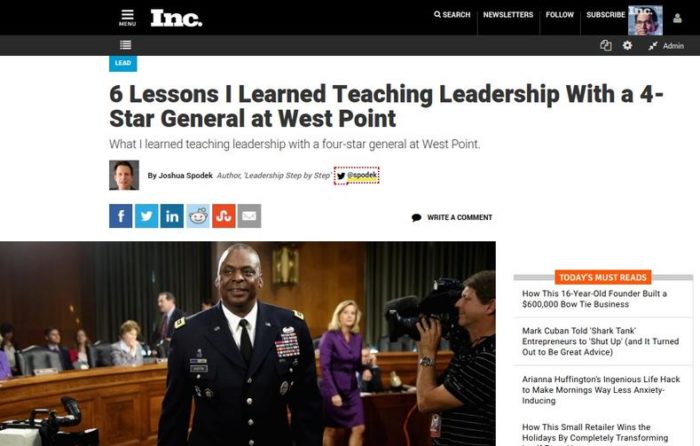A reader asks: “What makes a leader effective during a crisis? E.g. Covid19”
I remember helping General Austin co-lead some leadership workshops at West Point. He described a crisis West Point was experiencing that they all knew about—a recent graduate spoke poorly of the institution and community in a way that the media amplified. Then a former teacher—a Colonel—piled on the criticism, prompting questioning from alumni.
He asked cadets how they would handle the situation. I read their expressions as caring and determined, but they couldn’t figure out what to do. Graduate students in more advanced classes responded with similar uncertainty.
What struck me was not that they didn’t know what to do—there was no right answer—but that they didn’t want to be in a position to handle that crisis. They were glad the Superintendent was handling it.
I found myself thinking of ways I would handle it, even looking forward to it, hypothetically. I don’t know West Point as they do. The situation just looked like crises I’d led through before and I felt solutions I’d learned could apply here.

When I was younger and started to learn sports, I avoided playing during important games. I feared I might drop a pass or throw into an interception. As I improved, became captain of the team, and played on better teams, I preferred playing the big games. I might still drop passes—anyone might—but I’d played enough and learned enough that I felt I had the skills to stay calm and effective under pressure. I wouldn’t know what to do in all situations, but I felt I knew as well as anyone and therefore could act confidently, expecting I’d perform at least as well as anyone.
It’s easy to answer the readers’ question with specific tips like staying calm, focusing on emotions as much as facts, showing support, listening to followers’ problems, making them feel understood, and such. I see that style of answer in most leadership literature. The problem: knowing what to do doesn’t tell you how to do it.
Under stress, we don’t implement principles we once read. We don’t fall back on what we learned abstractly. We fall back on what we’ve practiced.
I’m going to answer your question by interpreting it to ask when a leader leads effectively in a crisis, what made that person into someone who acted effectively. I know of only one thing that results in someone behaving effectively at any performance of meaningful complexity, especially under stress: practice.
Practicing any performance—sports, acting, playing music, singing, improv, the military, and so on—will help. Practicing leading in challenging situations and crises will help more. While practicing doesn’t guarantee you’ll lead successfully in a crisis, lack of practice nearly guarantees you won’t—that is, practicing is necessary but not sufficient.
You have to reflect, learn from others with more experience, complement your practice with theory, get coaching, and so on, but they work best following practice, not replacing it. Nobody is born leading effectively.
The answer to what makes a leader effective under any circumstances is practice. To clarify, I mean effective practice, which means reflecting, seeking advice, seeking mentors, and what it takes to make practice effective, not flailing.
Everyone can practice leading all the time. We lead ourselves every moment, or can, thereby choosing not just to react. We can lead others in many interactions with them. When the teacher asks a question, raising your hand practices leadership, especially when no one else does. When your book club needs a place to meet, hosting or finding a place to host practices leadership. You can organize your community, make toasts at dinner parties, and start car pools.
When you’ve led enough, you know what to do in crises. When you haven’t you don’t.
To learn to lead through crises, lead as often and as much as you can. I suspect I didn’t answer what the reader expected, but it’s the answer I wished I’d heard more when I felt anxious and uncertain handling crises.
Read my weekly newsletter

On initiative, leadership, the environment, and burpees